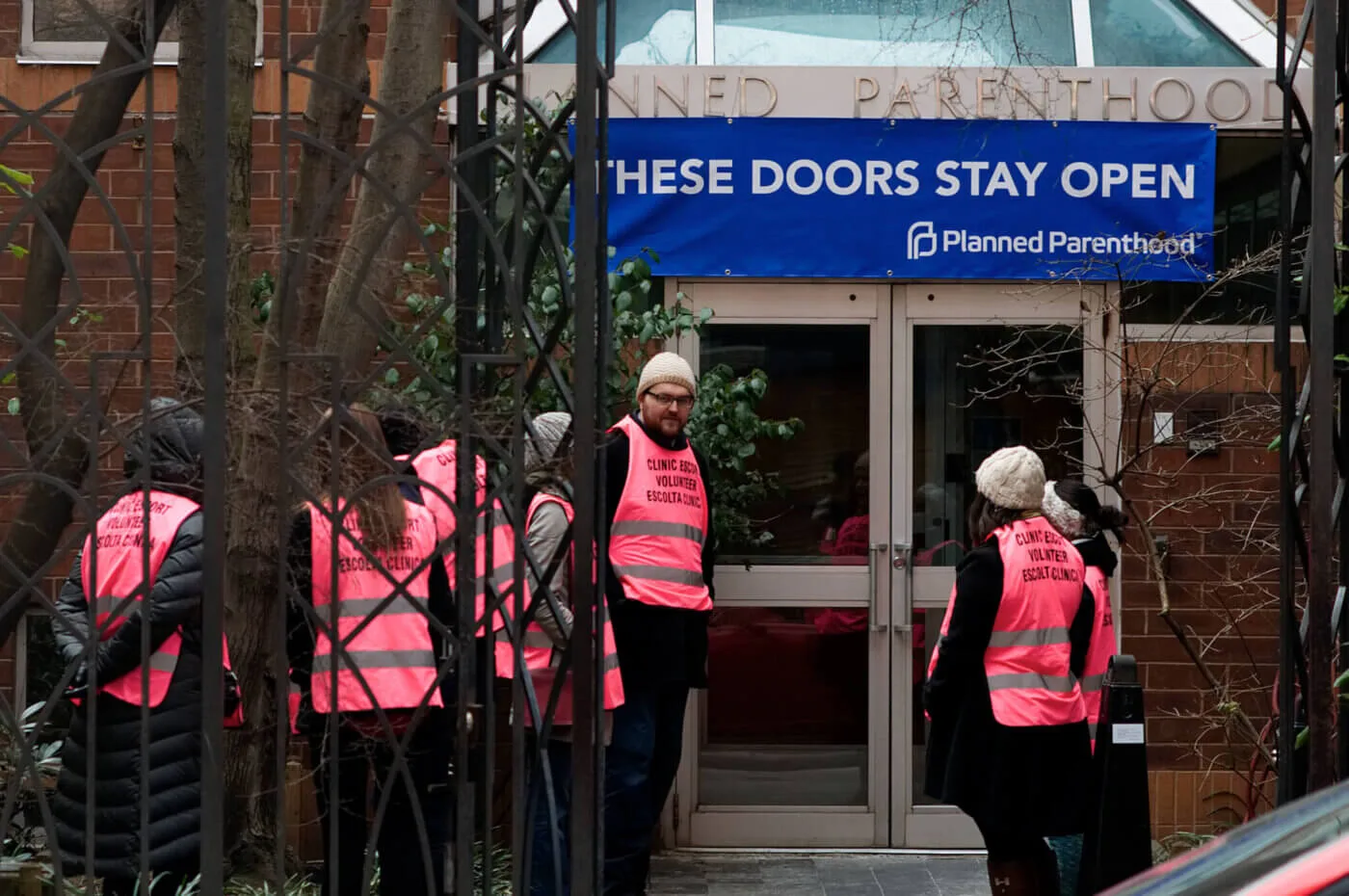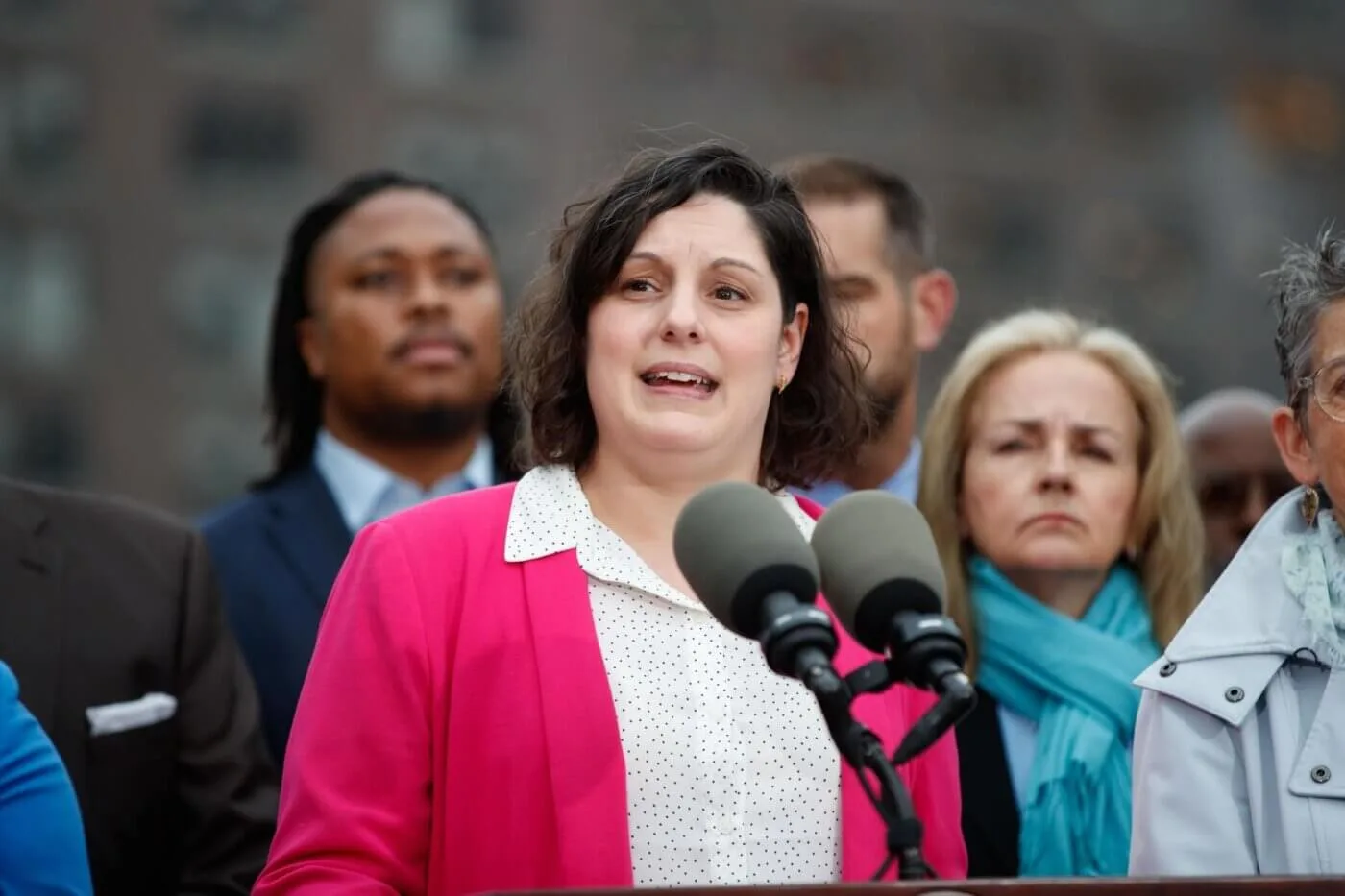
Planned Parenthood volunteers stand outside a clinic to grant clients free access to the facility without being harassed by protestors. (Photo by Bastiaan Slabbers/NurPhoto via Getty Images)
At reproductive health care clinics across Pennsylvania, patient escorts are the first line of defense for abortion rights. These volunteers put themselves between patients walking into medical facilities and the intimidating, harassing, and sometimes threatening protestors who oppose reproductive services. Now, a state representative has introduced a bill to protect all patients from violence and intimidation when seeking care at health clinics.
Every time Sylena Smith leaves the house on her way to volunteer, her husband says, “Love you. Don’t die.”
“It started as sort of a joke,” Smith said. “But it actually has serious underpinnings in this age we are living in. The threat of violence is more tangible.”
Smith is reminded of that more and more these days, as a volunteer patient escort for Planned Parenthood in western Pennsylvania.
“I regularly help patients faced with protestors who ignore common courtesy,” Smith said. “We have many protestors who won’t back off when a patient tells them ‘no,’ or ‘I’m not interested.’ They get into what I consider the patient’s personal space.”
In the eyes of Planned Parenthood, patient escorts are, quite literally, the first line of defense for abortion rights. Escorts are tasked with walking patients safely from the parking lots into medical centers, and serving as a buffer between the patient and the often loud, insulting, and intimidating protestors outside.
“One protester we call Ernest is so aggressive about harassing patients that I have to put my arm out to block him from entering the clinic behind patients while I’m holding the door for them,” Smith said. “He follows them from down the street and refuses to back off when rebuffed—he’ll step on their heels all the way into the lobby.”
“The intimidating behaviors don’t even stop after the appointment is over and the patient is leaving,” she continued. “Protesters stalk patients leaving the clinic. Some of them will follow patients all the way down the block, to the car or to the parking garage even when it’s clear that their presence is not welcome.”
Smith said if the patient escort weren’t there, she couldn’t imagine how much scarier the situation would be for the patient.
“Our presence reassures patients that there is going to be someone there who’s ‘got their back,’ who’s on their side,” she said. “And that’s really important.”
Enough Is Enough
In Pennsylvania, a Democratic lawmaker wants to give patients another line of defense.
Rep. Lindsay Powell (D-Allegheny) recently introduced House Bill 670, which would prohibit intimidation, obstruction, and/or violence against those seeking reproductive health care services, while also prohibiting defacement and damage to sites offering such services.
“As long as abortion is legal in Pennsylvania, all efforts must be made to not only keep reproductive health care readily accessible, but to keep both patients and providers safe during these processes,” Powell said. “Intolerance of any kind runs counter to the constitutional rights of residents and has no place in this Commonwealth. My bill would help curb potential threats and put the health and well-being of Pennsylvanians first.”
The bill was referred to the House Judiciary Committee, where it currently awaits a vote.
According to Tony Lepore, another Planned Parenthood patient escort in the Harrisburg area, the protection is definitely needed.
“At the clinic where I have volunteered, protesters appear every day that patients are there for abortion care. They swarm patients as soon as they park their cars and walk as close to the clinic as they’re allowed. They hold signs with graphic pictures that have nothing to do with the (abortion) procedure. They yell and shame the patients. They try to force their propaganda pamphlets into their hands.”
Sylena Smith agreed that the legislation is definitely needed.
“At Allegheny Reproductive Health Center, protesters stand in the street right outside the buffer zone and refuse to move out of the road when cars drive up to drop someone off,” Smith said.
She added that patients seeking health care should be free to walk through a parking lot and into a clinic, where they can learn about their medical options and make informed choices. And right now, the harassment and threat of violence is only escalating.
“If my body can be violated, then there is no liberty. Having a choice is where freedom begins.”
Support Our Cause
Thank you for taking the time to read our work. Before you go, we hope you'll consider supporting our values-driven journalism, which has always strived to make clear what's really at stake for Pennsylvanians and our future.
Since day one, our goal here at The Keystone has always been to empower people across the commonwealth with fact-based news and information. We believe that when people are armed with knowledge about what's happening in their local, state, and federal governments—including who is working on their behalf and who is actively trying to block efforts aimed at improving the daily lives of Pennsylvania families—they will be inspired to become civically engaged.


From clinics to crisis: Pennsylvania women will feel the pain of Medicaid cuts
In Pennsylvania, about one in every five women of reproductive age is enrolled in Medicaid. Dozens of family planning clinics throughout the state...

House GOP fast-tracks budget bill that would cut off Medicaid funding to Planned Parenthood
The budget package proposes steep health care cuts—and includes a new push to block patients from accessing reproductive care. In a 30-24 party-line...

State lawmaker wants to end mandatory counseling and waiting period for abortions in PA
A proposed bill from Democratic lawmakers would remove hurdles to getting an abortion in the state by taking away the currently mandated counseling...

Thousands of Pennsylvanians just had their reproductive health care halted by President Trump
Pennsylvania will lose a majority of its Title X funding—the only federal family planning program in the country. Planned Parenthood clinics, county...

‘The world has changed’: Legal battle in Pa. challenges Medicaid restrictions on abortion access
She was 19 and pregnant, and thousands of miles from home, when she found out that her insurance wouldn’t cover an abortion. A similar scenario has...





